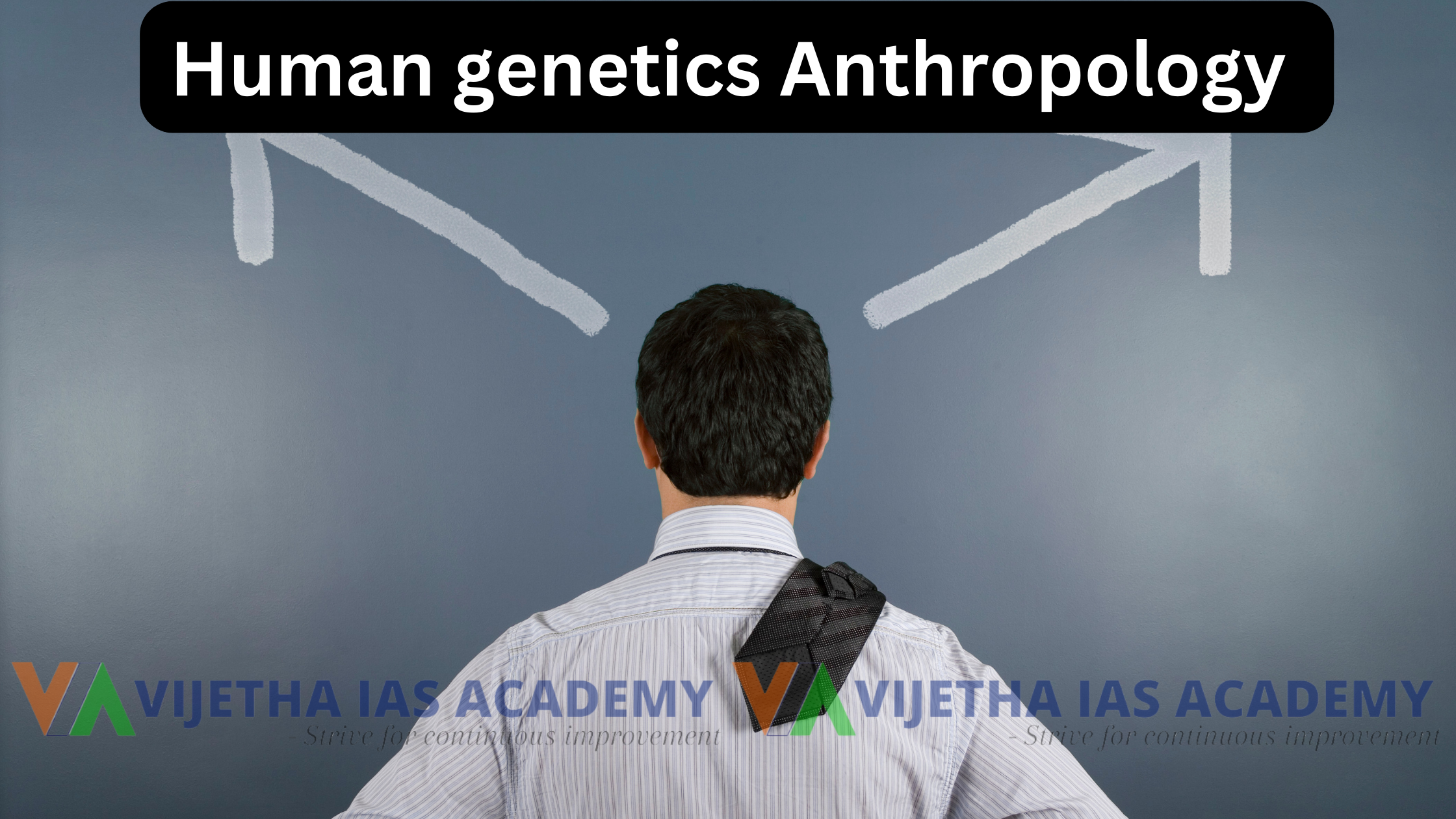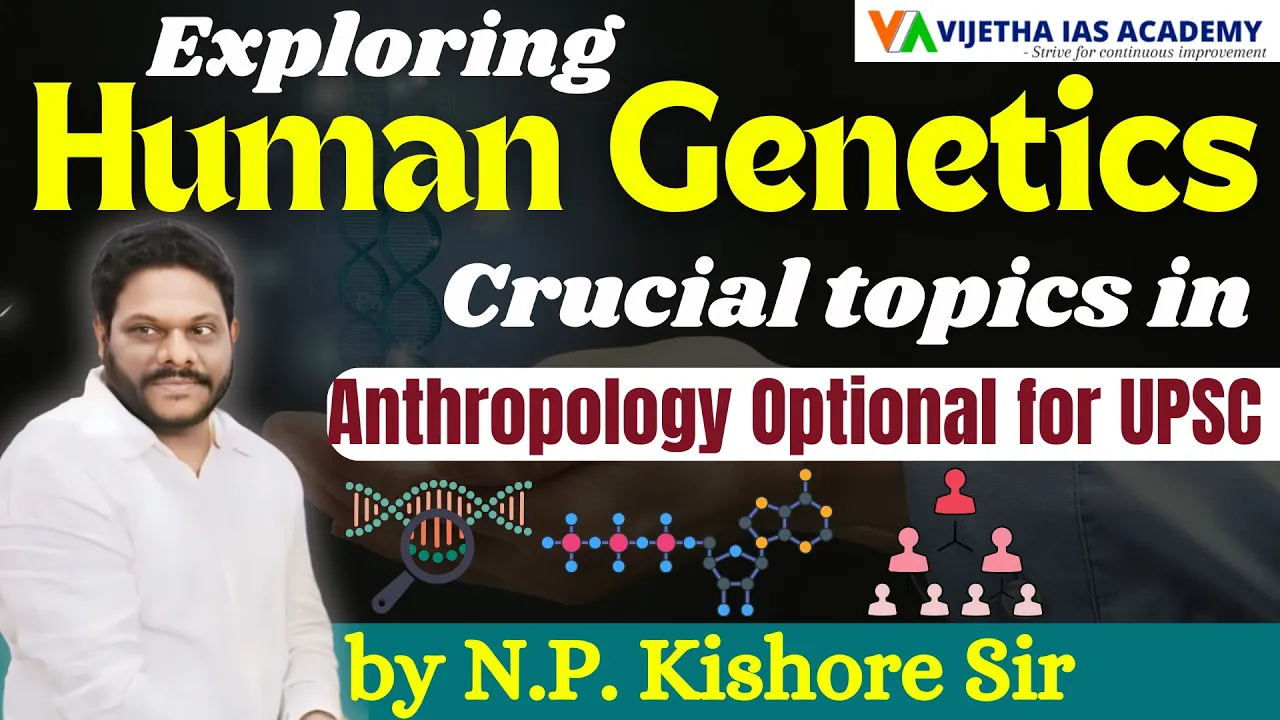
Mastering Human Genetics for UPSC Anthropology Optional
Human genetics is a pivotal area of study within anthropology, offering insights into the biological diversity and evolutionary history of humans. For UPSC aspirants opting for anthropology as their optional subject, a deep understanding of human genetics is essential. This field not only enhances your grasp of human biological variations but also equips you with the knowledge to address complex questions in the UPSC anthropology optional paper. This article will explore the fundamental concepts of human genetics and how expert guidance from Vijetha IAS Academy under the mentorship of Kishore sir can significantly bolster your preparation.
The Importance of Human Genetics in Anthropology
Biological Diversity
Human genetics helps in understanding the genetic variations that contribute to the biological diversity of human populations. This knowledge is crucial for comprehending the adaptive strategies of different populations in varied environments.
Evolutionary Insights
Studying human genetics provides insights into the evolutionary history of humans, tracing lineage and migrations. It helps in understanding how modern humans evolved and adapted over time.
Medical Anthropology
Human genetics is integral to medical anthropology, which explores the genetic basis of diseases, population genetics, and health disparities. This area of study is essential for addressing public health issues and developing effective healthcare policies.
Key Concepts in Human Genetics
1. Basic Genetic Principles
DNA and Genes
DNA (deoxyribonucleic acid) is the molecule that carries genetic information. Genes are segments of DNA that code for specific proteins, which in turn influence various traits and functions in the body.
Chromosomes
Humans have 46 chromosomes, arranged in 23 pairs. These chromosomes carry the genetic information inherited from both parents. The 23rd pair determines the sex of an individual: XX for females and XY for males.
Genetic Inheritance
The principles of genetic inheritance were first described by Gregor Mendel through his work on pea plants. Mendelian inheritance explains how traits are passed from parents to offspring through dominant and recessive alleles.
2. Population Genetics
Gene Pool and Genetic Drift
The gene pool refers to the total set of genes in a population. Genetic drift is a mechanism of evolution that causes random changes in the gene frequencies of a population, especially in small populations.
Gene Flow
Gene flow, or gene migration, occurs when individuals from different populations interbreed, leading to the exchange of genetic material. This process contributes to genetic diversity within a population.
Natural Selection
Natural selection is a process where individuals with advantageous traits are more likely to survive and reproduce, passing those traits to the next generation. This mechanism drives evolutionary changes in populations.
3. Human Genetic Variation
Single Nucleotide Polymorphisms (SNPs)
SNPs are variations in a single nucleotide that occur at specific positions in the genome. They are the most common type of genetic variation among humans and can influence traits and susceptibility to diseases.
Genetic Markers
Genetic markers are specific sequences of DNA that can be used to identify individuals or populations. They are useful in studying genetic diversity, ancestry, and evolutionary relationships.
Human Genome Project
The Human Genome Project was an international research effort to sequence the entire human genome. Completed in 2003, it has provided a comprehensive map of human genetic variation and has revolutionized the field of genetics.
4. Medical Genetics
Genetic Disorders
Genetic disorders are caused by abnormalities in the genome. They can be classified into single-gene disorders (e.g., cystic fibrosis), chromosomal disorders (e.g., Down syndrome), and multifactorial disorders (e.g., heart disease).
Genetic Screening and Counseling
Genetic screening involves testing individuals for genetic disorders or susceptibilities. Genetic counseling provides information and support to individuals and families affected by genetic conditions.
Personalized Medicine
Personalized medicine uses genetic information to tailor medical treatments to individual patients. This approach aims to improve the efficacy and safety of treatments based on genetic profiles.
5. Evolutionary Genetics
Molecular Evolution
Molecular evolution studies the genetic changes that occur at the molecular level, such as DNA and protein sequences. It provides insights into evolutionary relationships and the mechanisms of evolutionary change.
Human Ancestry and Migration
Genetic studies have traced the origins and migrations of human populations. Mitochondrial DNA and Y-chromosome analyses have been particularly useful in reconstructing human ancestry and migration patterns.
Enhancing Your Preparation with Vijetha IAS Academy
To master the complexities of human genetics, enrolling in specialized courses can be highly beneficial. Vijetha IAS Academy offers comprehensive courses tailored for UPSC aspirants, under the expert guidance of Kishore sir.
Benefits of Enrolling in Vijetha IAS Academy
- Expert Guidance: Learn from experienced educators like Kishore sir, who provide in-depth knowledge and practical insights into human genetics.
- Structured Curriculum: Follow a well-organized syllabus that systematically covers all essential topics, ensuring thorough preparation for the anthropology optional paper.
- Interactive Learning: Engage in discussions, doubt-clearing sessions, and interactive classes that enhance understanding and retention.
- Regular Assessments: Benefit from regular mock tests and practice papers to evaluate your progress and identify areas for improvement.
- Practical Exposure: Gain insights through case studies and real-life examples that bridge the gap between theoretical knowledge and real-world applications.
Integrating Human Genetics into Your Study Plan
Focused Study Sessions
Dedicate specific study sessions to each key concept of human genetics. Make detailed notes, including key terms, definitions, and examples. Use diagrams and flowcharts to visualize genetic processes and relationships.
Comparative Analysis
Engage in comparative analysis of different genetic mechanisms and their impacts on human populations. This approach will deepen your understanding and enable you to draw meaningful comparisons in your answers.
Current Affairs Integration
Regularly follow current affairs related to genetic research, medical advancements, and public health issues. Integrate this knowledge into your study plan to make your answers more relevant and up-to-date.
Answer Writing Practice
Practice writing answers to previous years' questions and mock tests. Focus on structuring your answers well, using specific examples to support your arguments, and critically engaging with the topics.
Reflective Practice
Reflect on how the study of human genetics relates to contemporary issues and current affairs. This will help you develop a nuanced understanding of the subject, which is essential for the UPSC exam.
Conclusion
Human genetics is a vital component of the UPSC anthropology optional syllabus. It offers deep insights into the biological diversity, evolutionary history, and medical aspects of human populations. Key concepts such as basic genetic principles, population genetics, human genetic variation, medical genetics, and evolutionary genetics are essential areas of study.
Enrolling in specialized courses like those offered by Vijetha IAS Academy and leveraging the expertise of Kishore sir can significantly enhance your preparation. Approach the UPSC exam with confidence, equipped with a thorough understanding of human genetics and its relevance to contemporary human societies.

